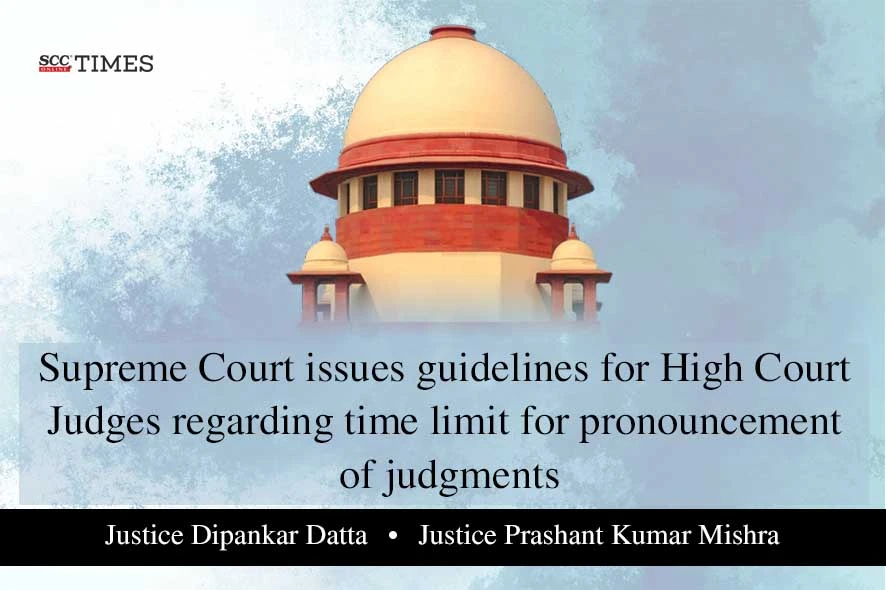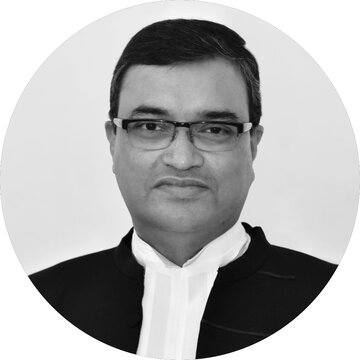Supreme Court: While considering the instant appeal, wherein the appellant alleged that the relevant reasoned order for his case was passed after 1 year in 2024 and the same was ante-dated to project that it was passed in 2023; the Division Bench of Dipankar Datta* and Prashant Kumar Mishra, JJ., strictly observed the egregious breach of law by the Gujarat High Court in dealing with the appellant’s case.
However, the Court being mindful of the pressure on the High Court Judges vis-a-vis pendency of cases, laid down 3 following options/guidelines for the Judges as regards to the time limit for delivering/ pronouncing judgments by the High Courts:
-
dictation of the judgment in open court.
-
reserving the judgment and pronouncing it on a future day,
-
pronouncing the operative part and the outcome, i.e., “dismissed” or “allowed” or “disposed of”, while simultaneously expressing that reasons would follow in a detailed final judgment supporting such outcome. Qua 3rd option, the Court said that it will in the interest of justice if any Judge, who prefers the third option, makes the reasons available in the public domain, preferably within 2 days thereof but, in any case, not beyond 5 days to eliminate any kind of suspicion in the mind of the party losing the legal battle.
The Court further suggested that if the pressure of work is such that in the assessment of the Judge, reasons in support of the final judgment cannot be made available, without fail, in 5 days, it would be a better option to reserve the judgment.
Furthermore, if the ultimate order would have the effect of changing the status of the parties or the subject matter of the lis, it would always be advisable to stick to the course envisaged in Order XX, CPC.
Background:
The appellant filed a petition under Article 227 before Gujarat High Court challenging an order passed by the Deputy Collector, Kamrej Prant, District Surat. The petition came up for consideration on 1-3- 2023 before the Judge.
According to the appellant, he was represented before the Judge by his counsel. Hearing having concluded on 1-3-2023, the appellant alleged that he was under the belief that the detailed order is reserved in the proceeding. However, even an order recording the reserving of orders had not been passed or made available on the official website of the High Court at that time. Since the detailed order was not pronounced, the appellant’s counsel did not also apply for the certified copy. In the process, more than a year passed by. On 30-4-2024, the appellant’s counsel received a soft copy of a reasoned order dated 1-3-2023 containing the reasons for dismissal of the petition from the IT Cell of the High Court.
At the beginning of the said order, “ORAL ORDER” was printed in bold font, i.e., it was supposed to be an order which has been dictated in open court. The appellant made a serious allegation that the reasoned copy of the impugned order was ante-dated to make it look as if it was given in March 2023.
Court’s Findings:
Taking note of the afore-stated allegation, the Supreme Court sought a report from the Registrar General of Gujarat High Court as to whether the allegation of the appellant that the reasoned order bearing the date 1-3-2023 was communicated to him for the first time on 30-4-2024 is correct or not.
Upon perusal of the report, the Court found that allegation of the appellant to be substantially correct. The Court found that the Judge dictated the reasoned order on 12-4-2024 to his personal secretary, where after such order was uploaded on the website of the High Court on 30-4-2024 as well as communicated to the appellant’s counsel by the IT Cell.
The Court further perused the recorded version of the proceedings of 1-3-2023 and found that appellant’s counsel being present and could hear what the Judge had said while his adversary acknowledged that he was “grateful”.
The Court noted that if not the appellant, but his counsel certainly did have knowledge of dismissal of the petition by the Judge; also, and that the appellant feigned complete ignorance and deliberately did not plead that his counsel was well and truly aware of the outcome of the petition moments after hearing stood concluded before the Judge.
However, during the perusal of the proceedings, the Court also found that the Judge did not even express that the ‘reasons would follow’ for the dismissal of the petition. Not having so expressed, the Judge practically rendered the court functus officio. Furthermore, it was not too clear as to whether any order of dismissal was signed on 1-3-2023, or at any point of time immediately thereafter, although the Disposal Log Report of 1-3-2023, the High Court duly recorded that the petition stood disposed of.
Major Observations:
Taking note of the afore-stated findings and allegations, the Court said that when a judgment is pronounced in open court, parties act on the basis that it is the operative judgment and that signing is a mere formality; however, in exceptional circumstances, an order pronounced in open court can be amended or even altered before the same has been authenticated by the Judge by signing the order but such a course ought to be adopted judicially, sparingly and for adequate reasons and upon putting the parties to notice.
However, such was not the case in the instant appeal. “We are inclined to the view that the learned Judge not having expressed that reasons for the dismissal would follow, His Lordship ceased to retain jurisdiction over the petition and foreclosed assignment of reasons for the dismissal”.
The Court said that assuming that the Judge were to express that reasons for the dismissal would follow, still there could be no valid reason to write a detailed reasoned order after lapse of a year having expressed “dismissed” and upload such order on the website.
The Court regretfully observed that the concerned Judge having realised in April, 2024 of having omitted to assign reasons for dismissal of the petition although he had pronounced “dismissed” in open court proceedings on 1-3-2023, could have avoided committing an act of indiscretion, by breaching all norms of ethics, in proceeding to assign reasons more than a year later. In accordance with the highest standards of fairness, propriety and discipline, the need of the hour required the Judge to bring the matter back on board once again, recall the verbal order of dismissal and place it before the Chief Justice of Gujarat High Court for assigning it to some other Bench for fresh consideration.
The Court observed that the society expects every Judge of a High Court to be a model of rectitude, an epitome of unimpeachable integrity and unwavering principles, a champion of moral excellence, and an embodiment of professionalism, who can consistently deliver work of high-quality guaranteeing justice. “Although, on the whole, the weight of work on Judges of the high courts across the country is immense and the Judges have also been performing commendably despite various odds, instances such as the one under consideration, which we view as nothing more than an aberration, bring disrepute to the judicial system of the country and show the entire judiciary in poor light. This, in our opinion, could have well been avoided with a little bit of care and caution, and deference to the decisions on the point by this Court”.
Emphasising on the need for prompt pronouncement of judgments, the Court pointed out that Order XX of CPC, 1908 ordains that a judgment can be pronounced, in an open court, either at once or as soon thereafter as may be practicable on a future day. However, Judges do come across cases requiring short orders which, in their assessment, may not consume more than 15/20 minutes. These orders are generally dictated in open court immediately after the hearing is over.
On the other hand, if in any given case the judgment could justifiably be reserved after hearing of extensive arguments, it would not be proper to criticize a Judge if he dictates the judgment in open court notwithstanding the length of time to be taken therefor. “As per the ordainment of Order XX, the learned Judge would be perfectly justified in doing so. In such cases, it could roughly take any time between 20 minutes to a couple of/few hours or even more spilling over to the next day (in rare cases) to accomplish the task. This approach could result in the board (if it is heavy) getting choked and the remaining cases on the board having slim chances of being considered”.
The Court emphasised that Judges must be mindful of the impact of their actions on the society at large. Dealing with lakhs of litigation is no mean task, but at the same time, Judges must realize that instances do emerge leaving absolutely no margin for error. “It is our duty as Judges to stand tall and rise to the challenge”.
The Court expressed its hope that Judges of the high courts while being careful and cautious will remain committed to the service of the litigants, for whom only they exist, as well as the oath of office that they have taken so that, in future, the Supreme Court is not presented with another case of similar nature to deal with.
“(…) learned Judges of the high courts working overtime to render justice to the litigants by conducting judicial proceedings, at times, by sitting in excess of normal working hours, discharging administrative duties in addition to judicial work, etc, and in the process overlooking health issues and sacrificing all pleasures of social life, we need to look at the issue wearing glasses of grace and compassion”.
Decision:
The Court stated that even though the appellant had not been entirely clean in his approach, the outcome of proceedings should be visibly just. Therefore, the impugned order dated 1-3-2023 was set aside, thereby resulting in the revival of the petition and same would be restored in the file of the High Court. The Chief Justice of Gujarat High Court to place the petition before the Judge currently having the assignment to hear the same.
CASE DETAILS
|
Citation: Appellants : Respondents : |
Advocates who appeared in this case For Petitioner(s): For Respondent(s): |
CORAM :










The time limit for pronouncement of the respective judgment should be strictly adhered & provisions for punishment for judges also should be in top most priority with a very short period so that the people of India would not deprive their right to avail the constitutional protection to maintain optimum democracy in the country